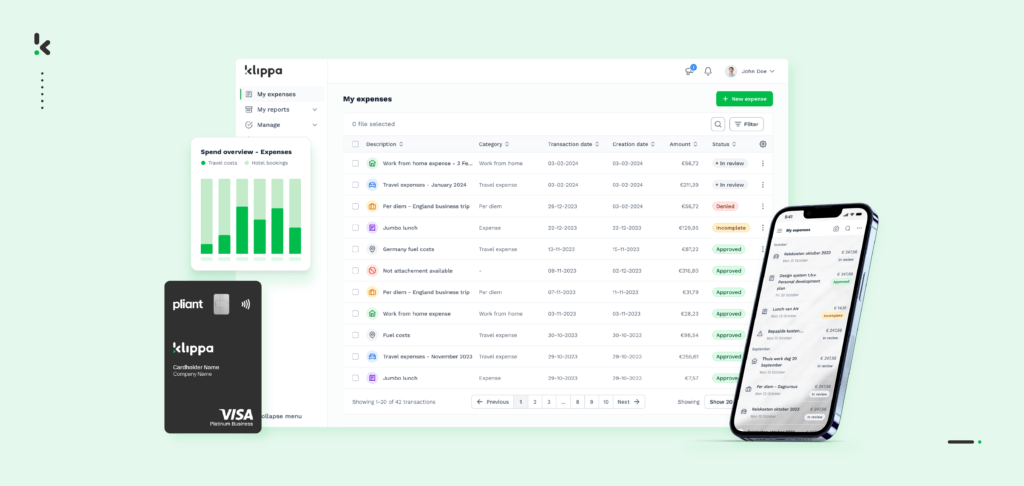

In 2025, Chief Financial Officers (CFOs) will be confronted more than ever with the need for agility and innovation in digital transformation. They must contend with new rules such as the approaching implementation of B2B e-invoicing and the demand for sustainable growth. All this while focusing on resource allocation and cost optimization in their day-to-day business.
This year, the main priorities driving CFOs’ agendas revolve around securing continued growth and ensuring the financial stability of their businesses. There is also a focus on compliance with new regulations, particularly concerning sustainability, as well as the adoption of advanced Artificial Intelligence (AI) technologies.
You have come to the right place if you are interested in these topics. This blog offers insights and tips into the upcoming changes and guides on how to manage financial operations efficiently.
Key Takeaways
- CFOs prioritize digital transformation, AI, and automation to drive efficiency and compliance
- New regulations like B2B e-invoicing (ViDA) and ESG reporting (CSRD) demand proactive adaptation
- Balancing growth and cost optimization is key, with AI improving decision-making
- CFO roles are expanding, requiring leadership in strategy, risk management, and talent development
- Economic and geopolitical risks make financial agility essential
The Top 4 CFO Trends of 2025
Here’s a brief look at 3 key trends for CFOs in 2025, focusing on business performance, regulatory compliance, and the increasing integration of AI and data analytics. In 2025, CFOs face a variety of significant concerns and challenges. Based on recent research and surveys, the primary issues include:
1. Balancing Growth and Cost Optimization
CFOs must balance promoting growth and cost optimization. Prioritizing digital transformation and improving employee engagement are critical to success. Cost optimization requires careful analysis and strategic prioritization to align with corporate goals.
Ensuring Growth
To ensure growth and profitability, CFOs need to recognize the central role of digital transformation. This involves prioritizing staff training to effectively handle advanced tools, such as software for automated expense and invoice processing, automated AP management, and automated reimbursement processes. These tools not only streamline workflows but also improve accuracy and efficiency.
Moreover, CFOs have to increase their efforts to attract and retain skilled professionals in the face of global talent shortages. At the heart of these efforts is a strategic focus on employee engagement and fostering a workplace culture that encourages innovation and high performance.
Cost Optimization
Following a year marked by the trends of global economic uncertainties including inflation and the looming threat of recession, cost optimization remains critical for CFOs.
As companies prioritize business performance, increasing efficiency becomes a key concern to tackle persistent economic, financial, and geopolitical uncertainties. This requires detailed analysis to identify unproductive areas and prioritize projects based on potential ROI.
Advanced technologies such as AI and data analytics are essential for identifying areas to optimize efficiency and maintain competitiveness. Using automated expense management software is one way to improve financial efficiency and streamline processes such as expense reimbursements, reporting, and approval workflows.
By leveraging these technologies, CFOs can conduct detailed analyses to prioritize projects with the highest return on investment, ensuring alignment with corporate objectives in 2025.
2. Regulatory Changes and Compliance
To navigate the dynamic financial landscape, CFOs must proactively adapt to regulatory changes. Anticipating and adapting to the latest corporate sustainability reporting or e-invoicing regulations is critical to minimize compliance risks and penalties.
In addition, prioritizing sustainability efforts is crucial as it ensures alignment with evolving corporate environmental and social responsibilities and strengthens the company’s reputation and long-term profitability.
Corporate Sustainability Reporting
A notable development is the EU’s Corporate Sustainability Reporting Directive (CSRD), which aligns with the Green Deal’s goal of developing Europe into the first climate-neutral continent.
The CSRD went into effect in 2023 and will have practical consequences for medium to large businesses from 2024 to 2028. By 2028, over 50,000 enterprises with significant EU operations must comply with CSRD, regardless of headquarters location.
The reporting aims to increase corporate transparency concerning sustainability and climate change and thus promote better decision-making and risk management. Clear guidelines for standardized, machine-readable disclosures are established to improve the comprehensibility and usefulness of the information provided.
E-Invoicing Regulations
The global e-invoicing regulations, originating from the EU’s “VAT in the Digital Age” (ViDA) proposal, mandate real-time digital reporting and e-invoicing for all B2B transactions. It’s crucial for companies operating across borders in these regions to adhere to these changes.
The e-invoicing process involves creating and storing invoices in a standardized electronic format, enabling automated reception and processing by the recipient’s accounting or ERP system. This eliminates the need for manual intervention and ensures compliance with mandatory real-time digital reporting for B2B transactions within the EU.
ESG Reporting
The importance of environmental, social, and governance (ESG) factors has increased due to consumer preferences and regulatory pressure to sustainable finance. CFOs must now integrate ESG factors into their financial reporting and strategy, making sustainability a critical component of corporate success.
Consequently, financial leaders are increasingly tasked with complying with specific sustainability regulations introduced by various countries. For example, the Netherlands has implemented mandatory CO2 registration to monitor and document business emissions.
Sustainable Strategies
Financial leaders are also increasingly aware of how climate change can affect their companies. As a result, nearly 33% of CFOs consider potential scenarios and are no longer relegated to distant future projections but integrated into daily tasks.
As a result, this year, CFOs are progressively including ESG issues into their financial plans. They are looking into green financing options and optimizing ESG performance to increase long-term value and resilience. This reflects the growing significance of sustainable finance strategies in corporate responsibility, a trend closely monitored by investors.
3. Expanding Scope of the CFO Role
CFOs are increasingly taking on broader responsibilities, including strategic leadership in technology adoption and enterprise-wide initiatives. This expansion necessitates effective delegation and time management.
Building Digital Finance Talent
There is a growing recognition of the need for digital skills within finance teams. CFOs are focusing on attracting, developing, and retaining talent proficient in digital technologies to drive transformation initiatives. Addressing this talent gap is crucial for the successful implementation of digital strategies and maintaining a competitive edge.
Managing Leadership Capacity and Time Allocation
With expanding responsibilities, CFOs must balance their time between strategic initiatives and traditional finance duties. Effective delegation and time management are critical to managing this broadened scope.
4. Navigating Economic and Geopolitical Challenges
CFOs are increasingly tasked with managing external challenges such as economic volatility, geopolitical tensions, and regulatory changes. These factors influence financial strategies and require CFOs to be adaptable and forward-thinking to safeguard the organization’s financial stability and capitalize on emerging opportunities.
Strategic Use of AI and Data Analytics
In 2025, using AI and data analytics for finance leadership is no longer a matter of choice, but a must. According to KPMG, 59% of C-suite leaders are transforming or have already integrated AI into their finance departments to streamline financial processes, perform predictive analytics and risk management, and make strategic decisions based on real-time data.
Data Storytelling
Data storytelling goes beyond data analysis to include the creation of narratives that effectively communicate insights to relevant audiences, like stakeholders. This art form combines contextualization and strategic use of information, enabling CFOs to tell coherent stories that underpin decision-making and deliver actionable results.
Automation Software for Financial Workflows
AI-driven automation software provides essential support for financial workflows by saving costs and valuable time compared to manual processes while increasing accuracy by detecting and preventing fraudulent activity. By moving from labor-intensive, repetitive administrative tasks to automation, automated workflows free up time and resources to focus on core tasks.
The following describes additional ways AI can aid CFOs in navigating the forthcoming changes in 2025.
How AI Empowers CFOs to Master the New Trends
When analyzing trends for CFOs in 2025, one notable solution crystallizes to effectively address the many challenges that may arise from the changing financial landscape: The integration of AI. According to Klippa’s recent research, nearly 80% of executives have confidence in AI’s ability to overcome the challenges of ensuring the financial health of their companies.
Consequently, the prevailing strategy entails investing in cutting-edge technology to streamline financial operations, minimize human error, and maintain competitiveness.
Integrating AI into your financial operations provides numerous benefits, including:
- Increased Efficiency: Reduced manual tasks, allowing for greater emphasis on core business activities and minimizing errors, ultimately leading to enhanced productivity.
- Deeper Data Insights: Built-in advanced analytics, allows deep insights into spending patterns, identifies cost-saving opportunities, and makes data-driven decisions that align with long-term business strategies.
- Streamlined Compliance: As regulations evolve, automation software ensures compliance with features that automatically adapt to new financial regulations. This ensures that businesses remain compliant without the constant need for manual updates.
- Advanced Fraud Detection: Allows to monitor transactions continuously, identify patterns indicative of fraudulent behavior, and adapt its detection techniques through machine learning algorithms.
- Sustainability Tracking: AI aids in monitoring and reporting on ESG-related expenditures, aligning financial practices with sustainable business goals. This feature supports CFOs in managing and reporting on sustainability initiatives, a growing necessity in today’s corporate world.
- Automated Spend Management: Automation software can optimize the expense reporting process, reducing errors and freeing up valuable time for strategic activities. This automation is crucial for managing the complexities of remote teams and increasing operational efficiencies.
Now that we’ve discussed how AI can help CFOs navigate future changes in the financial landscape, let’s look at a solution for CFOs to successfully integrate AI into their financial procedures.
Embrace the Future with Confidence with Klippa SpendControl
Klippa SpendControl offers the technological sophistication required to navigate the discussed complexities, making it an indispensable tool for forward-thinking CFOs. Embrace the future of finance with Klippa, and transform challenges into opportunities for growth and innovation.


Use the possibilities of Klippa SpendControl to:
- Streamline your financial operations by seamlessly integrating with your Accounting or ERP system
- Simplify receipt and invoice submission and approval via the intuitive app or web application
- Efficiently reconcile expenses with credit card statements, invoices, and receipts for enhanced accuracy
- Harness AI-driven data extraction technology to effortlessly capture invoice details, including invoice number, total sum, and multi-currency support
- Safeguard against financial fraud with automatic duplicate invoice detection
- Customize approval management systems with tailored business rules, ensuring streamlined workflows based on document conditions
So, are you ready to confidently embrace the future with Klippa SpendControl? Feel free to contact us directly or book a free demo with one of our experts down below!
FAQ
CFOs in 2025 are focusing on digital transformation, cost optimization, regulatory compliance, and sustainable growth. They are also expanding their roles beyond finance, embracing AI-driven automation, and managing economic and geopolitical challenges.
How are CFOs balancing growth and cost optimization?
CFOs are leveraging advanced analytics and AI to identify inefficiencies, streamline financial processes, and prioritize high-ROI projects. Digital transformation plays a key role in improving efficiency while ensuring sustainable business growth.
What regulatory changes are affecting CFOs in 2025?
CFOs must comply with new e-invoicing regulations, such as the EU’s VAT in the Digital Age (ViDA) proposal, and sustainability reporting mandates like the Corporate Sustainability Reporting Directive (CSRD). ESG reporting is also becoming a core requirement for financial leaders.
Why is AI crucial for CFOs in 2025?
AI helps CFOs enhance financial decision-making, automate workflows, improve fraud detection, and ensure compliance with evolving regulations. AI-driven tools also provide deep insights into spending patterns and enable proactive risk management.